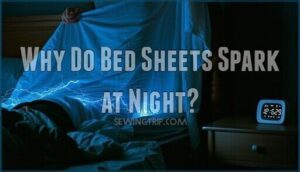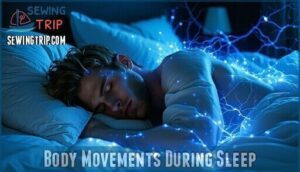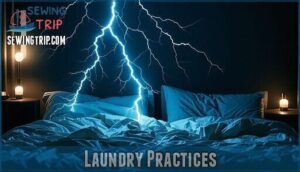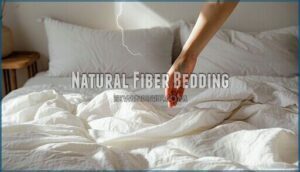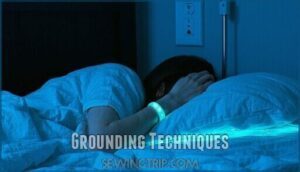This site is supported by our readers. We may earn a commission, at no cost to you, if you purchase through links.
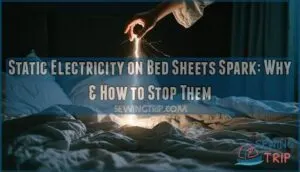 You’ve probably jumped out of bed after getting zapped by your sheets – that’s static electricity on bed sheets spark in action.
You’ve probably jumped out of bed after getting zapped by your sheets – that’s static electricity on bed sheets spark in action.
When you toss and turn, friction between your body and synthetic fabrics creates an electrical charge buildup. Dry air makes it worse, especially during winter months when humidity drops.
Your sheets become like tiny lightning rods, storing electrons until you touch them and get that shocking surprise. Cotton sheets spark less than polyester, but even natural fibers can zap you in the right conditions.
The good news? Simple fixes can turn your bedroom from a shock zone into a peaceful sleep sanctuary.
Table Of Contents
- Key Takeaways
- Static Electricity on Bed Sheets: Causes and Effects
- Why Do Bed Sheets Spark at Night?
- Factors Influencing Static Buildup in Bedding
- Safety Concerns: Static Sparks on Bed Sheets
- Reducing Static Electricity in Your Bedroom
- Science Behind Bed Sheet Static Discharges
- Measuring and Detecting Bed Sheet Static Electricity
- Static Electricity in Different Bedding Materials
- Seasonal Variations in Bed Sheet Static
- Health Implications of Bed Sheet Static Electricity
- Frequently Asked Questions (FAQs)
- Conclusion
Key Takeaways
- You create static electricity in bed sheets through friction when you move around at night, especially with synthetic fabrics like polyester that trap electrons and don’t absorb moisture well.
- You can prevent static sparks by switching to natural fiber bedding like cotton or linen, using a humidifier to maintain 30-50% humidity, and adding fabric softener to your laundry routine.
- You’ll experience more static during winter months when indoor heating systems strip moisture from the air, creating perfect conditions for charge buildup on synthetic bedding materials.
- You don’t need to worry about health risks from bed sheet static – while the sparks can disrupt your sleep and cause minor skin irritation, they’re completely safe and won’t cause serious harm.
Static Electricity on Bed Sheets: Causes and Effects
You’ve probably experienced that annoying shock when you pull back your covers or felt your hair stand up after getting into bed.
Static electricity builds up in your sheets through friction between fabrics, especially when you’re dealing with synthetic materials and low humidity environments that create the perfect storm for electron transfer.
Friction Between Fabrics
When you move around in bed, fabric friction creates the perfect storm for static electricity.
Your pajamas and bed sheets rub together, causing electrons to transfer between materials with different conductivity levels.
Here’s what happens during this electron dance:
- Material Conductivity Differences determine which fabric gains or loses electrons
- Surface Charge Density builds up as friction increases throughout the night
- Static Buildup Thresholds are reached when charge accumulation peaks
- Electron Transfer Rates vary based on fabric types and moisture levels.
This friction-powered process turns your cozy bed into a spark-generating zone!
Low Humidity Environments
Arid air turns your bedroom into a static electricity playground.
When humidity drops below 30%, dry air can’t dissipate electrical charges naturally.
Winter static becomes inevitable as indoor heating systems strip moisture from the air.
Desert climates and heated homes create perfect conditions for static cling.
Your bed sheets become charge magnets, building up energy until you touch them and—zap!
Synthetic Materials
Your polyester sheets are static electricity magnets.
These synthetic fabrics create more sparks than natural materials because they don’t absorb moisture and trap electrons easily.
Here’s why synthetic materials cause static cling:
- Polyester static builds up from poor moisture absorption
- Microfiber cling occurs due to tightly woven synthetic fibers
- Nylon sparks result from high electron retention properties
- Rayon buildup happens when friction meets synthetic processing
Electron Transfer Process
Understanding how synthetic fabrics create sparks leads us to the core mechanism: electron transfer.
When you move in bed, friction causes electrons to jump between materials with different conductivity levels.
This triboelectric effect creates a charge imbalance as materials exchange electrons based on their position in the triboelectric series.
Your sheets become electrically charged through this constant electron shuffling during sleep.
Charge Buildup on Surfaces
When electrons transfer between fabrics, they don’t just disappear—they accumulate on your bed sheets’ surfaces like tiny electrical prisoners.
This charge buildup creates invisible hot spots of static electricity across your bedding.
Low humidity effects reduce charge dissipation, while synthetic material properties trap electrons longer.
Poor surface conductivity means these charges stick around, waiting to spark when you least expect it.
Why Do Bed Sheets Spark at Night?
Your nighttime light show starts with simple friction. When you move around in bed, your body and pajamas create fabric friction against the sheets.
Your sheets become an electric battlefield every time you toss and turn at night.
This rubbing action causes electrons to jump from one surface to another, creating an electron imbalance that builds up as static electricity.
Here’s what creates those bed sheet static sparks:
- Dry air and low humidity – Your bedroom’s arid environment can’t dissipate the electrical charges
- Material conductivity differences – Synthetic fabrics hold charges better than natural fibers
- Static discharge causes – Built-up energy releases as visible sparks when surfaces separate
The lower the humidity, the more dramatic your bedroom fireworks become. It’s physics, not magic!
Factors Influencing Static Buildup in Bedding
Several key factors determine how much static electricity builds up in your bedding, and understanding them helps you tackle the problem at its source.
Your fabric choices, room humidity, sleep movements, and laundry habits all work together to create those annoying midnight sparks that jolt you awake.
Fabric Composition
Your fabric composition makes all the difference in static buildup.
Natural fibers like cotton and linen conduct moisture better, reducing those annoying sparks.
Synthetic fabrics trap electrons like magnets, creating more static cling.
| Fabric Type | Static Level |
|---|---|
| Cotton | Low |
| Polyester | High |
| Silk | Very Low |
| Microfiber | Very High |
| Linen | Low |
Thread count and weave density also matter—tighter weaves mean more friction.
Environmental Conditions
Several environmental conditions transform your bedroom into a static electricity factory.
Low humidity acts like a conductor’s worst nightmare, while fluctuating room temperature creates the perfect storm for static cling.
Here’s what turns your sheets electric:
- Humidity levels below 30% let dry air rule your bedroom
- Air circulation problems trap static charges around your bed
- Room temperature swings mess with moisture balance
- Seasonal changes bring winter static and environmental chaos
Body Movements During Sleep
Your nocturnal activity turns you into a friction machine.
Every time you’re tossing turning during sleep, your skin rubs against bed sheets, creating static electricity through sleep friction.
Higher movement frequency means more bedding contact and charge buildup.
Restless sleepers generate substantially more static than those who barely move.
This friction-based charging process continues throughout the night, accumulating electrical potential.
Laundry Practices
Your washing-machine habits can turn bed sheets into static shock generators.
Poor laundry practices create the perfect storm for nighttime zaps.
- Overloaded washers create excessive friction between fabrics
- High dryer heat strips moisture, amplifying laundry static
- Wrong detergent types leave residue that attracts charges
Air drying and proper washing frequency help minimize static buildup naturally.
Use of Fabric Softeners
Beyond tweaking your washing routine, fabric softener becomes your secret weapon against laundry static.
Different softener types offer varying levels of static cling protection, but choosing the right application method matters just as much as the product itself.
| Softener Type | Static Reduction | Cost Per Load |
|---|---|---|
| Liquid Fabric Softener | 70% | $0.15 |
| Dryer Sheets | 50% | $0.10 |
| Antistatic Spray | 85% | $0.25 |
Liquid softeners coat fibers during the rinse cycle, while dryer sheets work through heat activation. For maximum effectiveness against static electricity, skip the scent preferences debate and focus on performance.
For maximum effectiveness, the choice between different softener types should be based on their ability to reduce static cling, with options like Antistatic Spray offering higher static reduction rates.
Safety Concerns: Static Sparks on Bed Sheets
While those crackling sparks from your bed sheets might feel like tiny lightning bolts, they’re generally harmless to your health and won’t start a house fire.
However, you should be aware that static discharge can damage sensitive electronics like phones or tablets if they’re nearby.
And the repeated small shocks might disrupt your sleep quality.
Fire Hazard Assessment
Static electricity on bed sheets rarely poses serious fire hazards.
Spark energy from bedding typically falls below ignition thresholds needed to ignite fabrics.
However, flammability risks increase around certain materials:
- Hand sanitizer bottles near your bed
- Aerosol sprays on nightstands
- Paper tissues scattered on sheets
- Synthetic fabric blends with loose fibers
- Dust accumulation under beds
Smart prevention strategies guarantee electrical safety and material safety.
Electrical Equipment Risks
Your bedroom tech can take a beating from static electricity.
Those innocent-looking sparks pack enough punch to cause electronics malfunction, data corruption, and component damage in phones, tablets, and laptops.
Grounding issues amplify the problem.
Protect your gadgets with surge protection and avoid placing electronic equipment directly on synthetic bedding to prevent costly repairs.
Impact on Sensitive Electronics
Besides causing annoying shocks, static electricity from bed sheets can wreak havoc on your sensitive electronics.
Those innocent-looking sparks pack enough voltage to damage nearby devices through electromagnetic interference.
Your gadgets face these risks:
- Data corruption from voltage spikes
- Component damage to circuit boards
- Device malfunctions affecting performance
- Signal interference disrupting connections
Keep electronics away from static-prone bedding to protect your investments.
Potential Health Effects
Though static electricity seems harmless, it creates real health implications.
Repeated shocks cause sleep disruption, leaving you groggy and irritable.
Skin irritation worsens conditions like allergies and eczema.
Some people experience EMF sensitivity, reporting headaches and fatigue.
The psychological impact includes anxiety from unexpected zaps.
However, static discharge might offer circulation benefits by stimulating blood flow—nature’s tiny defibrillator!
Reducing Static Electricity in Your Bedroom
You can eliminate those annoying static sparks that wake you up at night by making simple changes to your bedroom environment and bedding choices.
The key is controlling humidity levels, switching to natural fiber sheets, and adjusting your laundry routine to prevent charge buildup before it starts, which involves making a few simple adjustments to prevent static sparks.
Humidifier Usage
Using a humidifier is a game-changer for tackling dry air and static shocks.
It boosts air moisture, reducing static buildup.
Here’s how it helps:
- Balances humidity: Keeps levels at an ideal 30-50%.
- Improves sleep: Say goodbye to zaps disrupting your rest.
- Eases breathing: Moist air soothes nasal passages.
- Energy-efficient options: Modern humidifiers save power while working wonders.
Consider a humidifier for static to specifically address this issue.
Natural Fiber Bedding
Switching to natural fibers like cotton sheets, linen, or wool bedding can work wonders against static electricity.
These materials naturally wick moisture, reducing dryness that fuels static buildup. Wool benefits include better insulation and static resistance, while silk bedding adds luxury without the shocks.
Consider natural bedding options for a static-free sleep. Even bamboo sheets or fiber blends offer comfort and fewer zaps, making sleep more peaceful.
Antistatic Sprays and Treatments
Antistatic sprays pack a punch against static electricity on bed sheets.
These treatments contain special compounds that neutralize charge buildup, stopping static cling before it starts.
You’ll find commercial brands at most stores, or whip up DIY sprays using fabric softener and water.
Light application techniques work best—just mist your bedding lightly.
Many users find bed spray products helpful for this purpose.
Most sprays offer long-term effects lasting several washes.
Grounding Techniques
Several grounding techniques can eliminate static electricity from your bed sheets.
Touch grounded metal objects like pipes before bed for instant static reduction.
DIY grounding involves connecting conductive materials to earth outlets.
Grounding cords attached to bed frames provide continuous body grounding.
Anti-static wristbands offer safe grounding while you sleep, preventing those annoying midnight sparks.
Proper Laundry Methods
Beyond grounding methods, your washing machine holds the key to static-free nights. Smart detergent selection and proper drying techniques can eliminate those annoying bed sheet sparks before they start.
Here’s how to wash away static electricity with these laundry tips:
- Use liquid fabric softener instead of powder to coat fibers smoothly
- Choose wool dryer balls over traditional dryer sheets for gentle static reduction
- Set low heat settings to prevent over-drying that creates charge buildup
- Remove sheets while slightly damp to maintain natural moisture balance
To further protect your sheets, consider that you can pre-wash new garments to minimize shrinkage.
Science Behind Bed Sheet Static Discharges
When you peel back your sheets and see tiny sparks fly, you’re witnessing the triboelectric effect in action—electrons jumping between materials like microscopic lightning bolts.
Your bedding becomes a charged battlefield where synthetic fabrics steal electrons from natural fibers, creating an electrical imbalance that discharges when you least expect it, a phenomenon that can be described as microscopic lightning bolts.
Triboelectric Effect
When you rub against your bed sheets, you’re creating the triboelectric effect through contact electrification.
Friction causes charge transfer between materials with different material properties.
Your skin and fabric exchange electrons, building surface charge that creates those annoying sparks.
Humidity influence affects this process—dry air amplifies static electricity while moisture reduces it.
| Material Pair | Charge Transfer Result |
|---|---|
| Skin + Cotton | Moderate static buildup |
| Skin + Polyester | High static generation |
| Cotton + Synthetic | Maximum spark potential |
Conductivity of Materials
How does material conductivity affect static electricity in your bed sheets?
Different fabrics handle electrical charges like different types of roads. Natural fibers like cotton and linen allow charge dissipation more easily than synthetic fabrics, which trap electrons and increase static generation.
- Natural fibers have better fiber resistance properties for releasing trapped charges
- Synthetic properties in polyester create electrical barriers that hold static longer
- Material conductivity varies dramatically between cotton highways and microfiber roadblocks
Electrostatic Induction
When you shift in bed, electrostatic induction creates static electricity without direct contact.
Your movement generates electric fields that influence nearby objects through the polarization process. This induced charge phenomenon explains why bed sheets spark unexpectedly.
- Hair stands up from electric fields around your pillow
- Blankets cling through grounding effects on your skin
- Static sparks jump between charged surfaces
- Induction applications affect electronic devices nearby
Charge Separation Mechanisms
When you slip into bed, your sheets and pajamas start playing electron hot potato through contact electrification.
This friction-driven electron transfer creates charge imbalances that build up on fabric surfaces until they’re ready to spark and zap you.
The Triboelectric Series determines who wins this microscopic battle—synthetic fabrics typically steal electrons from natural fibers.
Measuring and Detecting Bed Sheet Static Electricity
You can measure static electricity in your bed sheets using simple tools like electroscopes or static field meters to identify problem areas.
These detection methods help you understand the severity of static buildup and determine which solutions will work best for your specific bedding situation.
Electroscope Use
An electroscope is a simple yet effective tool for spotting static electricity on your sheets.
It works by detecting electric charges through material conductivity.
You can even build one at home using foil, a jar, and wire—perfect for classroom demonstrations or curious minds.
Watching the foil move as charges interact makes electroscope use both practical and fascinating.
Static Field Meters
Beyond basic electroscope use, static field meters offer precise measurements of electrostatic fields around your bed sheets.
These handheld devices detect charge accumulation through electrostatic field sensors, providing real-time data for accurate field mapping.
Proper meter selection and calibration guarantee measurement accuracy, while data interpretation helps you understand static levels and pinpoint problem areas in your bedding.
DIY Detection Methods
Without fancy equipment, you can easily detect static electricity on your bed sheets using common household items.
Try the hair test: rub a balloon on your hair, then hover it near your bedding to watch for attraction.
Create a simple electroscope DIY setup with aluminum foil strips that separate when charged.
Listen for crackling static sounds when moving sheets.
Professional Assessment Tools
When DIY methods aren’t cutting it, professional-grade tools give you precise readings.
These instruments measure exactly what’s happening with your bed sheets’ electrical behavior:
- Static electricity meters – Measure voltage and charge levels accurately
- Electrostatic voltmeters – Detect surface resistance and charge decay rates
- ESD testing equipment – Assess static buildup on different materials
- Humidity sensors – Monitor moisture levels affecting static formation
Using these tools safely is important, as some materials have lower conductivity overall.
Static Electricity in Different Bedding Materials
Your bedding material plays a huge role in determining how much static electricity you’ll encounter during sleep.
Natural fibers like cotton and silk generate less static than synthetic materials such as polyester and microfiber, which can turn your bed into a miniature lightning show.
Cotton Sheets
Cotton sheets naturally resist static electricity thanks to their fiber structure.
Higher thread count and tighter cotton weave reduce friction between fibers.
Organic cotton and Egyptian cotton perform best, while cotton blends with synthetics increase spark potential.
Natural fibers absorb moisture from air, dissipating charges before they build up into those annoying static sparks that zap you at bedtime.
For a luxurious feel, consider sateen cotton weaves.
Silk Bedding
Silk bedding’s smooth surface might seem anti-static, but don’t be fooled.
This luxurious fabric can still generate static electricity when rubbed against your skin or other materials.
While silk production creates naturally moisture-wicking fibers, dry air reduces these benefits.
Silk’s durability and comfort come at a silk cost, but proper humidity levels minimize static sparks effectively, ensuring a good night’s sleep with proper humidity.
Polyester and Microfiber Fabrics
Polyester and microfiber bed sheets are notorious static electricity culprits. These synthetic fabrics lack moisture-absorbing properties, making them prime candidates for static cling.
The tight microfiber weave traps electrons easily, while polyester properties create friction against your skin.
You’ll hear crackling sounds when pulling apart sheets
- Sparks might literally fly during nighttime movements
- Hair sticks up like you’ve been electrocuted
Wool Blankets
Unlike synthetic fabrics that create shocking wake-up calls, wool blankets naturally resist static electricity.
Wool benefits include excellent moisture-wicking properties that prevent charge buildup on bed sheets.
The lanolin coating on wool fibers acts as a natural conductor, dissipating static sparks before they form.
You’ll enjoy cozy warmth without annoying static cling zapping you awake, thanks to the natural properties of wool.
Memory Foam Mattresses
When you sink into your memory foam mattress each night, you’re potentially creating a static electricity trap.
These synthetic materials excel at heat retention and motion isolation, but their foam density can accumulate charges that lead to annoying static sparks.
Here’s what creates static cling with memory foam mattresses:
- Off-gassing chemicals reduce the mattress’s ability to dissipate electrical charges naturally
- Dense foam structure traps static electricity between your body and bed sheets
- Synthetic materials combined with low support levels create friction that generates static sparks
Seasonal Variations in Bed Sheet Static
You’ll notice static electricity in your bed sheets changes dramatically throughout the year, with winter’s dry air creating crackling sparks while summer’s humidity keeps things calm.
Your bedroom becomes a static battleground when heating systems strip moisture from the air, but understanding these seasonal patterns helps you predict when those annoying midnight shocks will strike, which can be a significant issue due to the dry air.
Winter Dryness Effects
Winter transforms your bedroom into a static electricity battleground.
Low humidity and dry air turn your cozy winter bed into a crackling static electricity battlefield.
Low humidity drops below 30%, creating perfect conditions for static buildup in bed sheets. Your dry skin becomes a charge magnet, while synthetic fabrics amplify the problem.
Smart fabric choice and mitigation methods protect your sleep quality from winter’s electrical assault.
| Winter Factor | Static Impact |
|---|---|
| Humidity Level | Below 30% increases charge buildup |
| Heating Systems | Remove moisture, worsen static |
| Dry Skin | Creates more friction with sheets |
| Indoor Air | Lacks natural moisture balance |
Summer Humidity Impact
Summer brings sweet relief from static electricity nightmares.
Higher humidity levels naturally reduce static buildup on your bed sheets, creating more comfortable sleep. When moisture content rises above 50%, those annoying sparks practically disappear.
Natural fibers like cotton and linen work even better during humid months, allowing better airflow and moisture absorption.
Here’s what summer does for your bedding:
- Eliminates crackling sounds when you move
- Reduces hair-standing-up moments
- Creates smoother sheet separation
- Prevents clothing from clinging to blankets
- Allows peaceful, uninterrupted sleep without electric surprises
HVAC System Influence
Your HVAC system plays a bigger role in bedroom static than you’d think.
Poor humidity control creates desert-like conditions that boost static buildup. Here’s how your system affects static levels:
| HVAC Factor | Static Impact |
|---|---|
| Low Humidity Output | Increases Static Substantially |
| Poor Air Circulation | Traps Dry Air |
| Inadequate System Maintenance | Reduces Humidity Control |
Proper system maintenance keeps humidity balanced year-round, which is crucial for reducing static buildup, and it’s essential to understand that poor humidity control can lead to increased static levels, and inadequate system maintenance can reduce humidity control.
Weather-related Static Fluctuations
Weather patterns directly influence your bed sheet static electricity levels throughout the year.
Barometric pressure drops and winter dryness effects create perfect storm conditions for sparks.
Thunderstorms naturally increase humidity levels, reducing static buildup overnight.
Hot, dry winds can amplify static, while gentle rain provides relief.
Your seasonal bedding feels these weather conditions – from crackling winter nights to calm summer sleep.
Health Implications of Bed Sheet Static Electricity
While bed sheet static electricity won’t send you to the emergency room, it can mess with your sleep quality and leave you feeling like you’re stuck in a science experiment.
Those midnight sparks might cause minor skin irritation, disrupt your rest patterns, or even trigger sensitivity issues in some people.
Though the good news is that any health effects are typically mild and temporary.
Sleep Disruption
Your body’s natural sleep rhythms can get scrambled when static electricity creates micro-shocks throughout the night.
These invisible disruptions affect your nervous system, leading to fragmented rest patterns.
One way to mitigate static is by selecting breathable sheet materials.
Static-related sleep issues include:
- Static Insomnia from frequent micro-awakenings
- Disturbed REM cycles reducing restorative sleep
- Chronic Fatigue from poor sleep quality
- Increased stress hormones disrupting natural melatonin production
Skin Irritation
Static electricity can turn your bed into an itch factory.
Those tiny sparks irritate sensitive skin, triggering allergic reactions and worsening eczema.
People with dry skin often experience static dermatitis – red, itchy patches that appear after contact with charged bed sheets.
The electrical charges disrupt your skin’s natural barrier, creating inflammation and discomfort that demands itch relief.
Electromagnetic Sensitivity Concerns
Electromagnetic sensitivity isn’t just science fiction. Some people report EMF hypersensitivity symptoms like headaches, fatigue, and sleep disruption from static exposure.
While research debates whether it’s real or placebo effect, you shouldn’t ignore persistent symptoms after electromagnetic sensitivity episodes.
Key concerns about EMF exposure from bed sheets:
- Sleep quality disruption from constant static discharge during rest
- Health impacts including irregular heartbeats and breathing issues
- EMF mitigation through grounding techniques and natural fiber bedding
- Static exposure reduction using humidifiers and antistatic treatments
Psychological Effects
Beyond physical discomfort, static electricity from bed sheets can mess with your head.
That sudden zap triggers anxiety induction, making you jumpy and alert when you should be winding down.
Your brain starts anticipating the next shock, creating restless nights and poor sleep quality.
People with sensory sensitivities feel it more intensely, though much of the sleep disruption comes from placebo effects – your mind amplifying what’s actually harmless static electricity.
Potential Benefits for Circulation
While some grounding product manufacturers claim static electricity from bed sheets offers circulation benefits through nerve stimulation and muscle relaxation, scientific evidence doesn’t support these assertions.
Electric shock from bedding won’t deliver improved bloodflow, reduced inflammation, or enhanced recovery.
Instead, focus on proven methods: exercise, proper nutrition, and adequate sleep to boost circulation naturally without sleep disruption.
Frequently Asked Questions (FAQs)
Why is my bedsheet sparking?
Your bedsheets are sparking because friction from tossing and turning creates static electricity, especially with synthetic fabrics in dry air.
Low humidity and polyester materials make you a human lightning rod.
Is it normal to see sparks from static?
Yes, you’ll definitely see sparks from static electricity in bed sheets.
It’s completely normal when synthetic fabrics rub together in dry conditions.
Those tiny lightning shows happen because electrons jump between surfaces, which is a clear example of electrons in action.
Why do my bed sheets have static electricity?
Your sheets create static when synthetic fabrics rub together, especially in dry air.
Low humidity lets electrons build up instead of dissipating.
It’s worse with polyester bedding and during winter months.
Is it safe to sleep in a bed with static electricity?
Don’t panic like you’re sleeping on a lightning rod!
Static electricity in bed sheets is completely safe for sleeping.
You’ll experience minor shocks and hair-raising moments, but there’s no health risk.
Why do my sheets have so much static electricity?
Your sheets collect static because synthetic fabrics like polyester rub together, creating friction.
Low humidity makes it worse.
Add some moisture with a humidifier, switch to cotton sheets, or use fabric softener.
Can static electricity cause a spark?
Like a telegraph operator sending signals, you’ll see tiny sparks when static electricity discharges from your sheets.
These miniature lightning bolts happen when electrons jump between surfaces, creating visible flashes during friction.
Why does an electric spark when I touch a blanket?
You’re experiencing static discharge when electrons build up on your blanket through friction, then jump to your body when you touch it, creating that annoying spark and shock sensation.
Why do some fabrics produce more static electricity than others?
Synthetic fabrics like polyester don’t absorb moisture and have loose electrons that transfer easily through friction.
Natural fibers like cotton hold moisture better, which helps dissipate charges before they build up.
How does humidity impact static electricity in bed sheets?
Humidity acts like static’s kryptonite.
When air’s dry, charges stick around with nowhere to go.
Add moisture through humidifiers or spray bottles, and you’ll watch that annoying cling disappear faster than socks in a dryer.
Are there any health risks associated with static electricity in bedding?
Static electricity in your bedding won’t harm you.
You’ll experience minor discomfort from small shocks and hair standing up, but there’s no significant health risk or long-term effects from bedroom static.
Conclusion
Surprisingly, static electricity can reach up to 25,000 volts in your bedroom – enough to power a small light bulb.
You’ve now learned why static electricity on bed sheets spark occurs and how to prevent those midnight jolts.
From choosing natural fibers to maintaining proper humidity levels, these simple solutions will transform your sleep experience.
Don’t let static shocks disrupt your rest any longer, implement these techniques tonight, and you’ll wake up refreshed instead of startled by unexpected electrical surprises, and have a better sleep experience with no midnight jolts.
- https://www.quora.com/Why-do-our-bed-sheets-spark-My-girlfriend-and-I-noticed-bright-sparks-when-we-just-move-our-hands-across-the-fabric-weve-never-seen-static-electricity-like-this
- https://www.reddit.com/r/NoStupidQuestions/comments/194ja0x/why_can_i_see_little_sparks_when_i_move_under_my/
- https://www.holmesproducts.com/how-to-get-rid-of-static-electricity-in-your-bedding.html
- https://souverhome.com/blogs/news/is-static-in-bed-sheets-dangerous?srsltid=AfmBOorQ5riyXoE37bn8KmpGSj7VtUt2Fuy7ttudSS33a8NrCZJG6qjk
- https://www.washingtonpost.com/dc-md-va/2022/01/09/sparks-in-bed-electricity/

